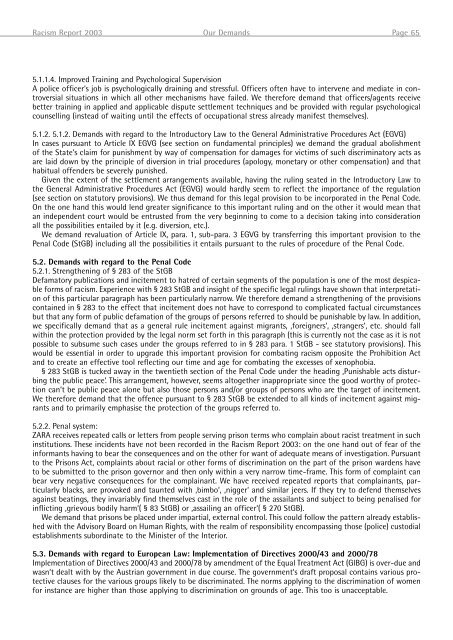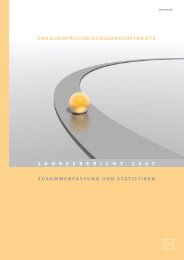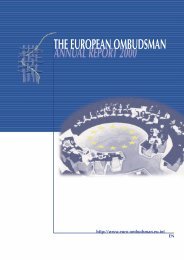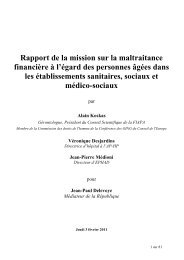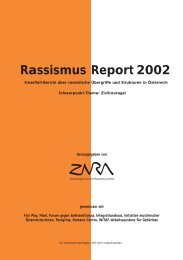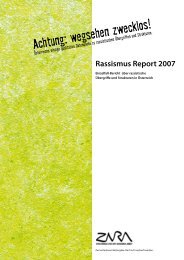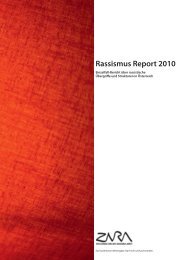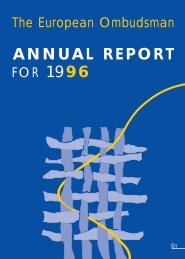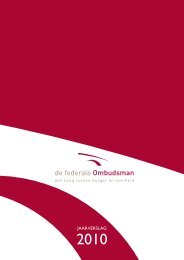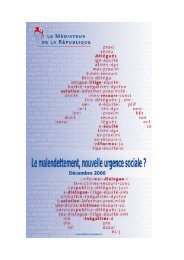Racism Report 2003 - Zara
Racism Report 2003 - Zara
Racism Report 2003 - Zara
You also want an ePaper? Increase the reach of your titles
YUMPU automatically turns print PDFs into web optimized ePapers that Google loves.
<strong>Racism</strong> <strong>Report</strong> <strong>2003</strong> Our Demands Page 655.1.1.4. Improved Training and Psychological SupervisionA police officer‘s job is psychologically draining and stressful. Officers often have to intervene and mediate in controversialsituations in which all other mechanisms have failed. We therefore demand that officers/agents receivebetter training in applied and applicable dispute settlement techniques and be provided with regular psychologicalcounselling (instead of waiting until the effects of occupational stress already manifest themselves).5.1.2. 5.1.2. Demands with regard to the Introductory Law to the General Administrative Procedures Act (EGVG)In cases pursuant to Article IX EGVG (see section on fundamental principles) we demand the gradual abolishmentof the State‘s claim for punishment by way of compensation for damages for victims of such discriminatory acts asare laid down by the principle of diversion in trial procedures (apology, monetary or other compensation) and thathabitual offenders be severely punished.Given the extent of the settlement arrangements available, having the ruling seated in the Introductory Law tothe General Administrative Procedures Act (EGVG) would hardly seem to reflect the importance of the regulation(see section on statutory provisions). We thus demand for this legal provision to be incorporated in the Penal Code.On the one hand this would lend greater significance to this important ruling and on the other it would mean thatan independent court would be entrusted from the very beginning to come to a decision taking into considerationall the possibilities entailed by it (e.g. diversion, etc.).We demand revaluation of Article IX, para. 1, sub-para. 3 EGVG by transferring this important provision to thePenal Code (StGB) including all the possibilities it entails pursuant to the rules of procedure of the Penal Code.5.2. Demands with regard to the Penal Code5.2.1. Strengthening of § 283 of the StGBDefamatory publications and incitement to hatred of certain segments of the population is one of the most despicableforms of racism. Experience with § 283 StGB and insight of the specific legal rulings have shown that interpretationof this particular paragraph has been particularly narrow. We therefore demand a strengthening of the provisionscontained in § 283 to the effect that incitement does not have to correspond to complicated factual circumstancesbut that any form of public defamation of the groups of persons referred to should be punishable by law. In addition,we specifically demand that as a general rule incitement against migrants, ‚foreigners‘, ‚strangers‘, etc. should fallwithin the protection provided by the legal norm set forth in this paragraph (this is currently not the case as it is notpossible to subsume such cases under the groups referred to in § 283 para. 1 StGB - see statutory provisions). Thiswould be essential in order to upgrade this important provision for combating racism opposite the Prohibition Actand to create an effective tool reflecting our time and age for combating the excesses of xenophobia.§ 283 StGB is tucked away in the twentieth section of the Penal Code under the heading ‚Punishable acts disturbingthe public peace‘. This arrangement, however, seems altogether inappropriate since the good worthy of protectioncan‘t be public peace alone but also those persons and/or groups of persons who are the target of incitement.We therefore demand that the offence pursuant to § 283 StGB be extended to all kinds of incitement against migrantsand to primarily emphasise the protection of the groups referred to.5.2.2. Penal system:ZARA receives repeated calls or letters from people serving prison terms who complain about racist treatment in suchinstitutions. These incidents have not been recorded in the <strong>Racism</strong> <strong>Report</strong> <strong>2003</strong>: on the one hand out of fear of theinformants having to bear the consequences and on the other for want of adequate means of investigation. Pursuantto the Prisons Act, complaints about racial or other forms of discrimination on the part of the prison wardens haveto be submitted to the prison governor and then only within a very narrow time-frame. This form of complaint canbear very negative consequences for the complainant. We have received repeated reports that complainants, particularlyblacks, are provoked and taunted with ‚bimbo‘, ‚nigger‘ and similar jeers. If they try to defend themselvesagainst beatings, they invariably find themselves cast in the role of the assailants and subject to being penalised forinflicting ‚grievous bodily harm‘( § 83 StGB) or ‚assailing an officer‘( § 270 StGB).We demand that prisons be placed under impartial, external control. This could follow the pattern already establishedwith the Advisory Board on Human Rights, with the realm of responsibility encompassing those (police) custodialestablishments subordinate to the Minister of the Interior.5.3. Demands with regard to European Law: Implementation of Directives 2000/43 and 2000/78Implementation of Directives 2000/43 and 2000/78 by amendment of the Equal Treatment Act (GlBG) is over-due andwasn‘t dealt with by the Austrian government in due course. The government‘s draft proposal contains various protectiveclauses for the various groups likely to be discriminated. The norms applying to the discrimination of womenfor instance are higher than those applying to discrimination on grounds of age. This too is unacceptable.


